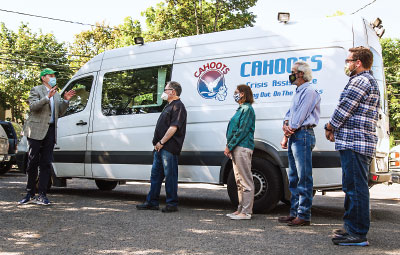According to a database compiled by the Washington Post and regularly updated, as of press time, 5,598 people have been shot and killed by a police officer in the line of duty since January 1, 2015. Twenty two percent, or 1,254, of those individuals were experiencing a mental health crisis.
Psychiatrists and mental health professionals have long pushed for policies and programs that would create alternatives to law enforcement when someone experiences a mental health crisis. For decades, the White Bird Clinic in Eugene, Ore., has been running one such mobile crisis intervention program, called CAHOOTS, or Crisis Assistance Helping Out on the Streets.
In the hopes of making the CAHOOTS model easier to replicate across the country, Sens. Ron Wyden (D-Ore.) and Catherine Cortez Masto (D-Nev.) have introduced the CAHOOTS Act, which will grant states enhanced Medicaid funding to provide community-based mobile crisis services. The White Bird Clinic’s CAHOOTS model can be “a guidepost for other communities around the country,” said Wyden, a ranking member of the Senate Finance Committee, during a press conference call on the legislation. “I want programs like CAHOOTS all across the country to become a part of Medicaid’s DNA.”
White Bird Clinic was established in 1969, and through the years, it has developed strong relationships with the community and local public safety system, explained Tim Black, director of consulting with White Bird Clinic. In 1989, White Bird Clinic launched CAHOOTS using a retired ambulance and police radios.
When it first started, CAHOOTS operated a 24/7 crisis hotline and a walk-in center on evenings and weekends. Now, it has expanded to provide 24-hour coverage to the cities of Eugene and Springfield. “We’re perceived by the community on the same level as law enforcement, fire, and [emergency medical services],” Black said.
The CAHOOTS response team, consisting of a mental health crisis worker and an emergency medical technician, are embedded within the local public safety system. When dispatch centers receive emergency calls, the dispatcher determines if the situation requires police, emergency medical services, or CAHOOTS.
Sometimes, the CAHOOTS team will respond to a crisis alongside police officers, but in those situations the officers are there only to maintain safety so that CAHOOTS can provide the primary intervention, Black explained. Those interventions include crisis counseling, suicide prevention, conflict resolution, substance use intervention, and transportation to services.
Since the death of George Floyd in May in Minnesota, movements across the country have advocated for a national reckoning with how law enforcement agencies operate, pushing to “defund the police” or reallocate law enforcement funds to community services, such as mental health care (see
Psychiatric News).
“Across the U.S., you hear police departments and union leaders saying that officers don’t want to be mental health workers,” Black said. “The CAHOOTS program provides an alternative to traditional public safety responses. It’s really about sending the right first responder to the right call.”
Stephanie Maya Lopez, M.D., an associate professor of psychiatry at Oregon Health and Science University, noted that carrying out a deinstitutionalization policy without adequate investment in community services in the United States has resulted in increasing numbers of people with severe symptoms of mental illness.
Too often, people who are severely symptomatic end up in the public eye, particularly if they are experiencing homelessness. When law enforcement gets involved, Lopez explained, the best-case scenario is that the officer has some background in social work or crisis intervention to help the individual access services. “But law enforcement officers are not well trained to do that, and it’s not the role they’re meant to play,” she said.
More often, those interactions result in the officer carrying out his or her duty of enforcing the law. “That may mean the person is arrested and put into jail, which during a pandemic, of course, has an added risk,” Lopez said. “There’s also a risk of injury to both the individual and the law enforcement officer if there is a physical component to the interaction. Tragically, it can even lead to death because these situations can escalate very rapidly.”
Wyden and Cortez Masto’s legislation would provide a 95% match in Medicaid funding to states to run programs similar to CAHOOTS, as well as $25 million in planning grants to help states get the programs established. In addition to crisis services, the programs are required to provide individuals with referrals to follow-up care.
Lopez emphasized that providing strong crisis response interventions is only one piece of the puzzle. “We have to look at the whole system and make sure that people are getting the services they need when they need them,” she said. “But when we’re talking about the interaction with law enforcement, anything we can do to reduce that contact and make it safe, person centered, and recovery oriented, the better it will be for people in crisis and law enforcement officers.” ■
More information about the CAHOOTS Act is posted
here.


